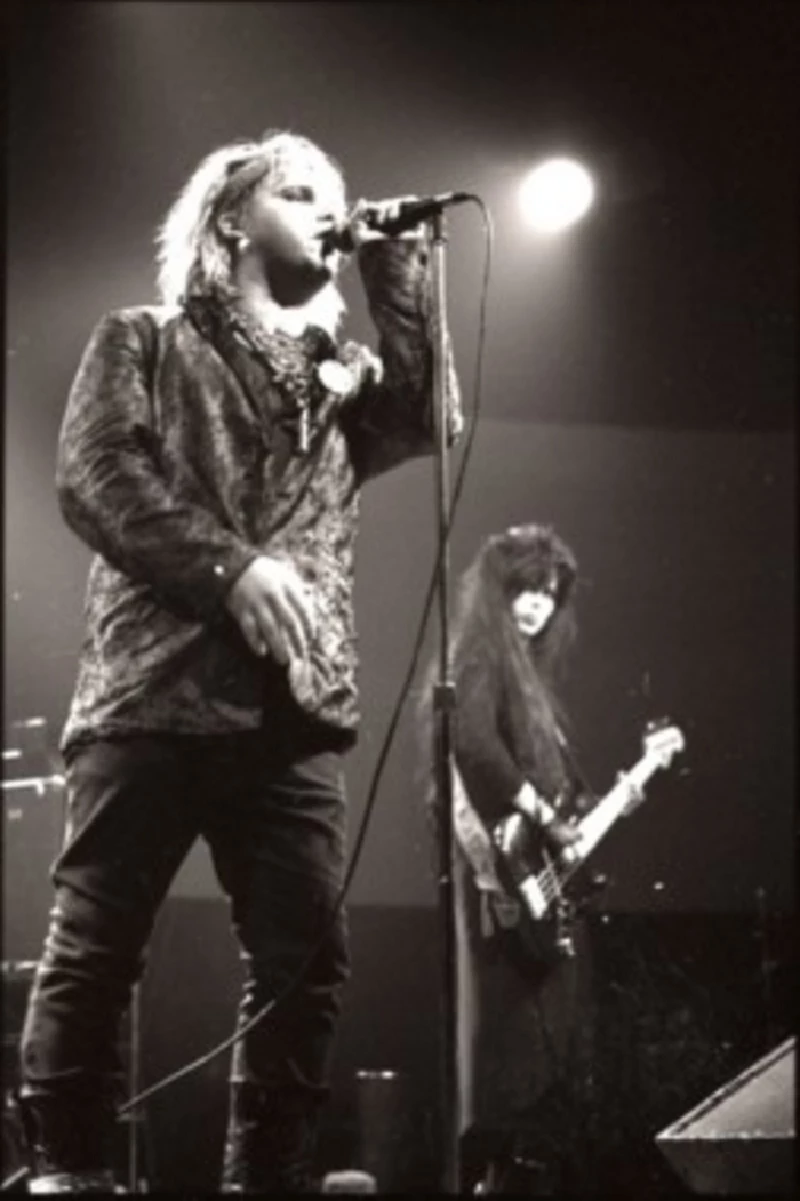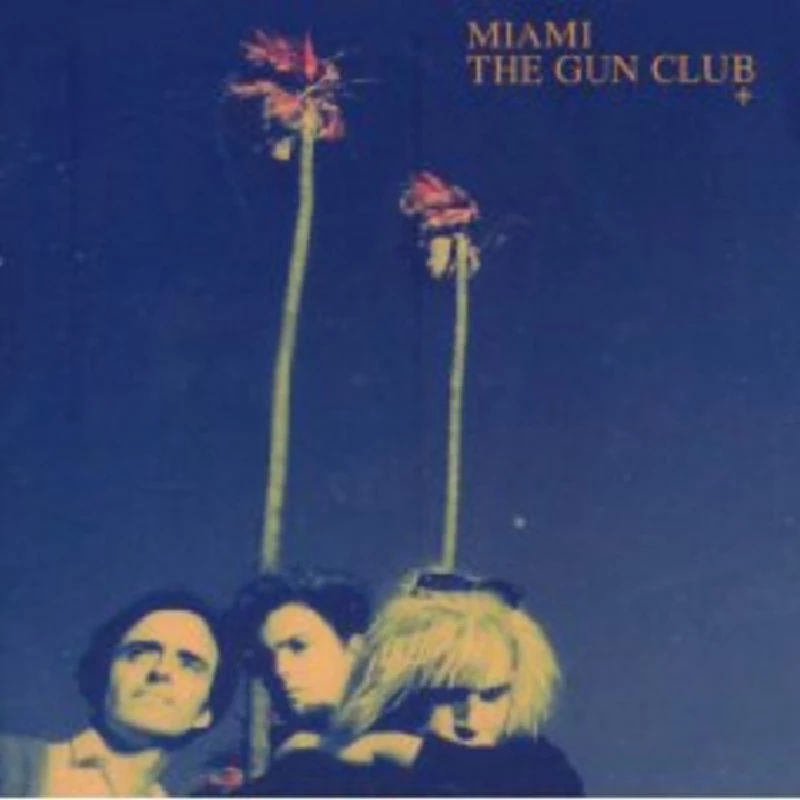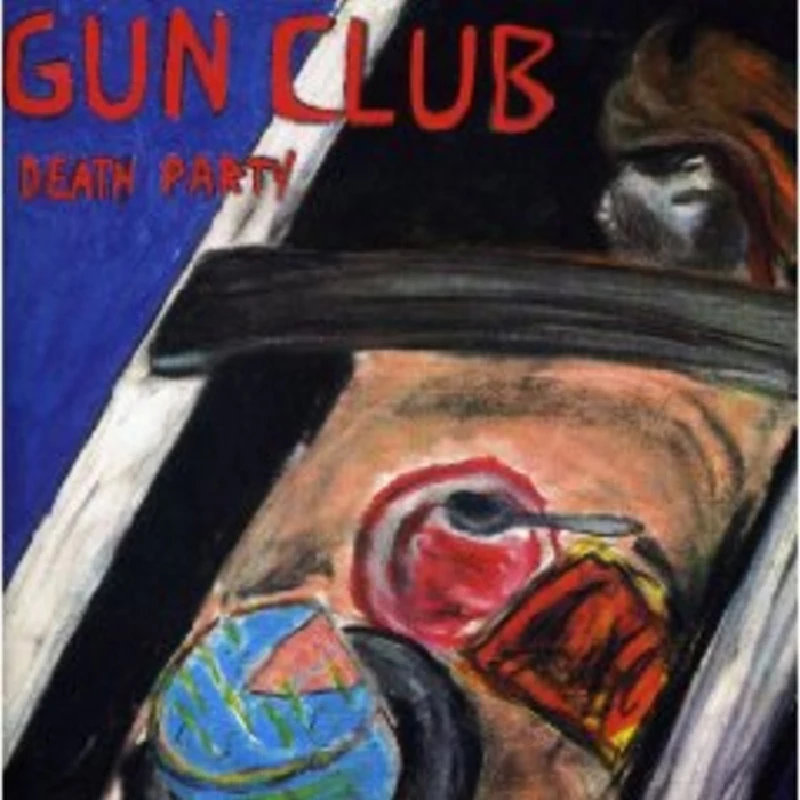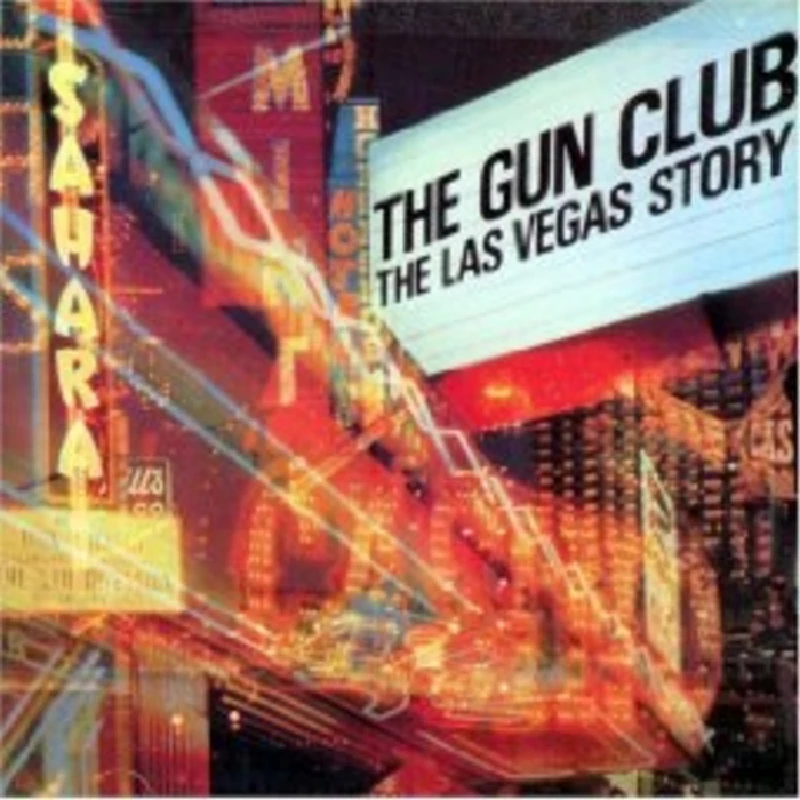Gun Club - Gun Club
by Jon Rogers
published: 20 / 10 / 2009

intro
Jon Rogers reflects on the history of 80s blues punks, the Gun Club, who have recently had reissued thier second and third albums, 'Miami' and 'The LA Story', and also an EP, 'Death Party'
The original line-up of Los Angeles’s the Gun Club could have quite legitimately called themselves the Fan Club. Band leader, lead singer and main songwriter Jeffrey Lee Pierce had been the president of the Blondie fan club. Original guitarist Kid Congo Powers (aka Brian Tristan) had set up a Ramones fan club in LA and the band’s first drummer, Brad Dunning, ran a Mumps appreciation society. Odd one out was Don Snowden who took up bass duties. The origins of the band lay in the Cyclones that was fronted by Pleasant Gehman but who left after one gig. With Gehman gone they changed their name to Creeping Ritual and Pierce took up vocal duties before changing their name to the Gun Club, the moniker being suggested by Black Flag and Circle Jerks member Keith Morris, who was Pierce’s flatmate at the time. “I guess I was just waiting around for all this to happen,” Pierce told Richard Cook for the 'NME' in 1983. “When Kid Congo and I started the group the whole concept was to play two or three times and then break-up, so we could bum drinks off LA Weekly writers. Then we got popular so fast.” Looking back at his sporadic involvement with the Gun Club, Powers has a great admiration for Pierce: “[He] was able to show me what vision is, from an artist’s view. Compared to most people around punk rock at the time, he was unusual – well travelled, very literate and he really knew about all these old blues guys when, for everybody else, going back to the roots was the Rolling Stones.” The band though would have a high turnover of members after it was formed in 1980, setting the standard that the group never really had a stable line-up. In fact perhaps only the Fall have had such a harsh hire ‘n’ fire policy when it came to band members. Getting out quick was Powers who left the band to join the Cramps – who weren’t that dissimilar to the Gun Club. Powers though would be in and out of the band throughout its lifespan making appearances with Pierce in 1984, 1987 and then for a two year stretch from 1990 as well as finally in 1995. A whole host of musicians would come and go over the band’s life with Pierce remaining as the only constant figure. Most notable of these is probably Patricia Morrison who played bass on their third album, 'The Las Vegas Story'. The publicity photos for that album see her in full goth attire, looking like some cross between a drug-crazed member of the Addams Family and an extra from 'Carry on Screaming'. It’s perhaps not surprising she would go off and join up with the Sisters of Mercy. Although Pierce had been born in Texas in 1958 he had been raised in California and both would come to have an influence on his song writing. Early musical influences would be though the rather unlikely reggae and jazz. Before actually wanting to play music Pierce wrote about reggae for the now defunct LA fanzine 'Slash'. “I lost track of reggae entirely after 'Slash' magazine folded,” Pierce told 'Sounds' in 1982. “The records started getting too expensive and I just lost interest. I got much more interested in blues and country music and that was about the time I was starting the band." “I went through long phases of being strictly into them [jazz and reggae], but this blues and country field has also been feeding my own hustle so I’ve been deeper into it, not just for the sake that I enjoy it but also because I find lots of ideas in it. Whereas jazz and reggae are really much too foreign for what I’m doing. I could never really use any of those influences.” Pierce though wouldn’t forget his love of jazz and amongst the bonus live material now released with the reissues he tells the audience at a New York gig, “We’re a jazz group... We just don’t play that well” before dedicating ‘For the Love of Ivy’ to saxophonist Sonny Rollins. But Pierce was particularly becoming interested in the blues, telling the 'NME' in May 1983, “You take the Delta blues people. Occasionally somebody sounds like somebody else but basically Son House, Charley Patton, King Solomon Hill, Willie McTell, William Harris... they all sound completely different from one another. Attitudes and keys and picking style.” While he loved the blues he still had an uneasy relationship with it saying also in 1983, “I’m not black and I’m not from the Delta. I can’t really do blues. Perpetrating all those Robert Johnson images... I did all that for a while and it was really fun. There’s a lot to learn from it as far as really tuning up your feel for music. But you run up against a brick wall – that it’s a false thing. After listening to Howlin’ Wolf, Robert Johnson, you can somehow also develop a taste for Hank Williams and people like that. You start to understand country music as a white form of the blues.” Pierce would take the blueprint of blues and country and warp them through his own demented psychobilly vision to create a sort of zombie swamp delta blues, voodoo rock that also picked up a southern Americana accent. The Gun Club’s primitive style would be captured on their take of Creedence Clearwater’s classic ‘Run Through the Jungle’ on their second album ‘Miami’. The band break down the song’s component parts but then rebuild it into a disturbing tale of misery – complete with added new lyrics hinting at murder and necrophilia. Pierce would set the band’s blueprint with their first album ‘Fire of Love’, which was originally released by 'Slash' (the label being affiliated to the magazine Pierce once worked for) in 1981 and contained a rather anarchic take on Robert Johnson’s ‘Preaching Blues’ as well as ‘Sexbeat’ At times though Pierce’s uglier side would peek through with lyrics like the clumsy line, “Searching for niggers down in the dark” which would lead some commentators to accuse the band of racism. The album, which cost $2,000 to make according to Pierce, put the Gun Club at odds with the prevailing LA music scene at the time, even amongst its more underground strands. At the time hardcore bands like Bad Religion and Shattered Faith prevailed, dominating the clubs and radio was filled with the so-called ‘New Pop’ which left Pierce and friends rather on their own. The latter particularly irked Pierce who told 'The East Village Eye' in 1982, “Synthesizer bands from England are taking over the world. I think generally most English music of this period is some of the worst stuff I’ve ever heard... It’s like muzak. A lot of ‘em sound like Genesis.” The Gun Club may have been out of step with the prevailing trend in LA at the time but they weren’t entirely alone. The lesser known the Blasters were also rediscovering American roots music along similar lines of country, blues and rockabilly. Bands like Lone Justice and Blood on the Saddle were also making similar discoveries. Rock’s rediscovery of its roots and hardcore weren’t so dissimilar. Both adopted a back to basics style, rejecting musical progress and finesse for a rudimentary style. While ‘Fire of Love’ gained, largely, positive reviews it has rather dated now and seems rather ham-fisted, both musically and lyrically. It’s rudimentary style just coming across as crude and basic. The passion was there, it just wasn’t expressed that well. Pierce then switched labels, signing to Animal which was run by ex-Blondie guitarist Chris Stein, relocating the band temporarily, to New York for the recording of their second album ‘Miami’ in June 1982. Stein would also produce the record. The band’s Blondie association would also be reinforced by a certain ‘DH Lawrence Jr’ appearing on backing vocals. This literary pseudonym was otherwise known as Debbie Harry. While some reviewers disliked what they considered to be Stein’s rather thin production, which failed to capture the band’s hellfire and fury it established the band as one of America’s leading ‘alternative’ bands. While the band’s basic take on psychobilly punk remained as the cornerstone, ‘Miami’ broadened the band’s sound. Along with the primordial scream from the guts there was now a greater subtlety and along with Pierce’s blues heroes like Skip James and Howlin’ Wolf there were people like The Doors and Marc Bolan as well as post-punk British groups like Joy Division and the Fall. On songs like the closing ‘Mother of Earth’ there was the slightest tint of what nowadays critics would term alt-country or nu-folk. Pierce later admitted that he stole the entire bass line from a Skip James record. “It’s much more South-Western type thing,” Pierce remarked about the song in 1982. “Country music out there is different – you don’t get too many crooning love ballads, just things about the desert and the highway. No Nashville syrup. West Texas music was really good too, people like Willie and Waylon were like the Sex Pistols to country in 1969 [...] I think almost all the best American music came out of the South. Doo wop came out of the North. That’s about the only good thing they contributed.” ‘Miami’, admitted Pierce, wasn’t as “wild” as the debut but that was the way he wanted it. “It was intended to be thicker, more full. I wanted to encompass more of a general feeling of doom. I didn’t want it to be so immediate. The other record is more of a drinking record. This record is more of a junkie record or something.” Lyrically, Pierce was still obsessed by things like vengeance, death, violence and sex. Asked once if brutal murder fascinated him, Pierce replied, “Oh, of course” before adding “I find that really interesting. I wonder if one day I’ll actually brutally murder someone just to see what it’s like.” Cracks were beginning to show though. The Chrysalis press release put out with ‘Miami’ contained a quote from Pierce in response to a question about the future of the band: “No future. I’ve never been so bored in my whole life. I’ll go anywhere anyone wants to take us. And do anything. To be a piece of dust, just float. I’ve got the Bo Diddley attitude of hey, let’s make some records, there’s nothing else to do.” And there seemed to be a revolving door policy on band members. Rob Ritter was out, Patricia Morrison was in. Drummer Terry Graham and guitarist Ward Dotson got their marching orders. Dee Pop, once of the Bush Tetras, sat on the drum stool next but only lasted eight months before Graham returned. Jim Duckworth took up guitar duties but when the band were about to embark on an Australian tour Duckworth, along with Graham, refused to get on the plane. And Kid Congo Powers was back in the band in late 1983. The chaos in the band mirrored Pierce’s own slow descent into self-destruction as he fell into drug and alcohol addiction. And to compound matters he also suffered from periods of depression. “Writing’s a good way to get a lot of depressing matters off your chest [...] I don’t know why I can’t just have a good time and write silly songs like the Cramps do. But I don’t. I only write songs when I’m in a bad mood, so they all come out like that. When I’’m in a good mood, I just go crazy.” Along with the line-up changes the band itself seemed to implode every so often with Pierce breaking-up then reforming the band on a regular basis. No matter who was playing in the Gun Club, Pierce was always in charge. In an interview for 'Alternative America' in 1983 he said, “The band is important for playing, but the writing is basically still mine. The general feel of the material will still pretty much prevail over whatever I am doing.” In amongst all this upheaval the band found time to go into New York’s Blank Tapes studio in 1983 with Stein and record the five-track EP ‘Death Party’. Despite the band’s troubles the four piece rip through some takes on what have become firm favourites amongst fans like the opening ‘The House on Highland Avenue’ and the pained ‘The Lie’ as well as the bleak title track. The songs are difficult listening as Pierce effectively describes his own disintegration. The EP sees the band take on a more straight-forward rock band approach, dropping the country influences. Pierce was rather dismissive describing the EP as just “five suitable songs from the files that could be learned quickly and recorded at short notice.” The reissue comes with a live set in Zürich in March 1983 which captures the band caught between delivering a master class performance and collapsing in front of the audience’s eyes. But the end – for now – was almost in sight. With Powers back in the band, Pierce, Morrison and Graham got together for ‘The Las Vegas Story’ in March and April 1984. Songs like the title track, ‘Walkin’ with the Beast’ and ‘The Stranger in Our Town’ showed the band had grown in confidence and become more assured but it was hardly a great leap forward. It was more of the same and offered nothing really new. And the fans tended to agree and while it gained positive reviews, mostly in the UK, it failed to take off, sealing the band’s fate in Pierce’s eyes. Despite the lacklustre response, if you’re going to only own one Gun Club record, this is the one to get. It captures the essential, core essence of the band and features possibly the best line-up of the band. But that wasn’t enough for Pierce and the band disbanded. “I set a limit with the Gun Club of three records,” Pierce told 'ZigZag' in March 1985. “If nothing significant changed with the third one I wasn’t going to pursue the band any further. I thought I had the best incarnation of the group. If it didn’t work I didn’t want to work with anyone else and call it the Gun Club. It was the best work I could do in that style. It would have to do a lot or I wasn’t going to bother doing it again [...] I explained months before [to the band]: unless the record went through the roof – it didn’t – I’d lose interest and the group would break up. I was very open about it with everyone.” That wasn’t quite the end and Pierce – as well as Powers – couldn’t quite escape the ghost of the Gun Club. After a short-lived solo career Pierce brought the band back to life in 1987 for the album 'Mother Juno 'but once again failed to gain much excitement as did subsequent albums that popped up every so often. The Gun Club was finally laid to rest once and for all once when Pierce died in March 1996, aged 37, from a brain haemorrhage. Powers went on to have a four-year stint with Nick Cave and the Bad Seeds from 1986 and was also part of Die Haut. “I’m not sure exactly what his demons were,” said Powers in 2006 about Pierce. “But they were always coming out on stage. His performances were a kind of public exorcism. At the heart of it, he was a very sweet guy and musician.” Musically, The Gun Club never quite fulfilled their promise and were never quite as good as you hoped they would be. The failure to keep a stable line up, just as much as Pierce’s own personal problems, no doubt didn’t help. As such they’re more important for their influence rather than what they achieved. Jack White might profess his love of the blues to all and sundry but he would appear to love the Gun Club just as much, attempting covers of ‘For the Love of Ivy’ and ‘Jack on Fire’ live. White would also be quoted as saying: "'Sexbeat', 'She's Like Heroin To Me', and 'For The Love Of Ivy'... why are these songs not taught in schools?” Former Screaming Trees singer Mark Lanegan did his own take on ‘Carry Home’ on his solo album ‘I’ll Take Care of You’ and you can hear the band’s influence on groups like REM, the Pixies and the Von Bondies.
Picture Gallery:-



most viewed articles
current edition
Carl Ewens - David Bowie 1964 to 1982 On Track: Every Album, Every SongArmory Show - Interview with Richard Jobson
John McKay - Interview
Colin Blunstone - Thalia Hall, Chicago, 16/7/2025
Billie Eilish - O2 Arena, London, 10/7/2025
Bathers - Photoscapes 1
Visor Fest - Valencia, Spain, 26/9/2025...27/9/2025
Loft - Interview
Sir Tim Rice - Interview
Robert Forster - Interview
previous editions
Manic Street Preachers - (Gig of a Lifetime) Millennium Stadium, Cardiff, December 1999Heavenly - P.U.N.K. Girl EP
Beautiful South - Ten Songs That Made Me Love...
Oasis - Oasis, Earl's Court, London, 1995
Peter Perrett - In Dreams Begin Responsibilities Interview Part One
Boomtown Rats - Ten Songs That Made Me Love....
Coldplay - Wembley Arena. London, 16/8/2022
Prolapse - Interview
Pixies - Ten Songs That Made Me Love...
Trudie Myerscough-Harris - Interview
most viewed reviews
current edition
Davey Woodward - Mumbo in the JumboSick Man of Europe - The Sick Man of Europe
Lucy Spraggan - Other Sides of the Moon
Amy Macdonald - Is This What You've Been Waiting For?
Phew, Erika Kobayashi,, Dieter Moebius - Radium Girls
Bush - I Beat Loneliness
Suzanne Vega - Flying With Angels
Alice Cooper - The Revenge of Alice Cooper
Cynthia Erivo - I Forgive You
Blueboy - 2
Pennyblackmusic Regular Contributors
Adrian Janes
Amanda J. Window
Andrew Twambley
Anthony Dhanendran
Benjamin Howarth
Cila Warncke
Daniel Cressey
Darren Aston
Dastardly
Dave Goodwin
Denzil Watson
Dominic B. Simpson
Eoghan Lyng
Fiona Hutchings
Harry Sherriff
Helen Tipping
Jamie Rowland
John Clarkson
Julie Cruickshank
Kimberly Bright
Lisa Torem
Maarten Schiethart